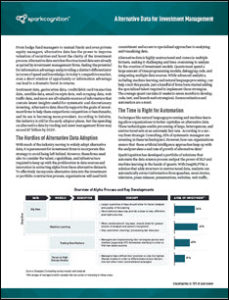
From hedge fund managers to mutual funds and even private equity managers, alternative data has the power to improve valuation of securities and boost the clarity of the investment process. It enriches the structured data sets already acquired by investment management firms, fueling the potential for information advantage and providing a distinct differentiator in terms of speed and knowledge. In today’s competitive market, even a short window of opportunity or information advantage can lead to a dramatic boost in returns.
Sentiment data, geolocation data, credit/debit card transaction data, satellite data, email receipts data, web scraping data, web traffic data, and more are all valuable sources of information that contain latent insights useful for systematic and discretionary investing. Alternative data directly supports the goals of investment firms to help them outperform competition or benchmarks, and its use is becoming more prevalent.
Techniques like natural language processing and machine learning allow organizations to better capitalize on alternative data. These technologies enable processing of large, heterogenous, and unstructured sets at an extremely fast rate.
A new report from SparkCognition explores the challenges for alternative data adoption, how to overcome them, and explores the potential of automation.
All information that you supply is protected by our privacy policy. By submitting your information you agree to our Terms of Use.
* All fields required.




